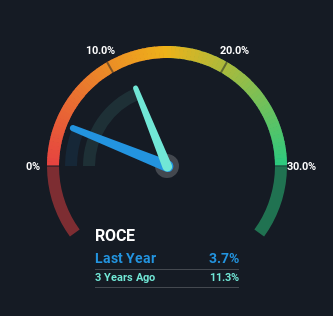- Hong Kong
- /
- Entertainment
- /
- SEHK:2125
Strawbear Entertainment Group (HKG:2125) Could Be Struggling To Allocate Capital
Finding a business that has the potential to grow substantially is not easy, but it is possible if we look at a few key financial metrics. Firstly, we'll want to see a proven return on capital employed (ROCE) that is increasing, and secondly, an expanding base of capital employed. If you see this, it typically means it's a company with a great business model and plenty of profitable reinvestment opportunities. In light of that, when we looked at Strawbear Entertainment Group (HKG:2125) and its ROCE trend, we weren't exactly thrilled.
Understanding Return On Capital Employed (ROCE)
For those that aren't sure what ROCE is, it measures the amount of pre-tax profits a company can generate from the capital employed in its business. Analysts use this formula to calculate it for Strawbear Entertainment Group:
Return on Capital Employed = Earnings Before Interest and Tax (EBIT) ÷ (Total Assets - Current Liabilities)
0.037 = CN¥67m ÷ (CN¥2.5b - CN¥662m) (Based on the trailing twelve months to December 2022).
So, Strawbear Entertainment Group has an ROCE of 3.7%. On its own that's a low return, but compared to the average of 2.7% generated by the Entertainment industry, it's much better.
View our latest analysis for Strawbear Entertainment Group

While the past is not representative of the future, it can be helpful to know how a company has performed historically, which is why we have this chart above. If you're interested in investigating Strawbear Entertainment Group's past further, check out this free graph of past earnings, revenue and cash flow.
SWOT Analysis for Strawbear Entertainment Group
- Debt is not viewed as a risk.
- Earnings declined over the past year.
- Trading below our estimate of fair value by more than 20%.
- Lack of analyst coverage makes it difficult to determine 2125's earnings prospects.
- No apparent threats visible for 2125.
How Are Returns Trending?
On the surface, the trend of ROCE at Strawbear Entertainment Group doesn't inspire confidence. Around five years ago the returns on capital were 25%, but since then they've fallen to 3.7%. Given the business is employing more capital while revenue has slipped, this is a bit concerning. This could mean that the business is losing its competitive advantage or market share, because while more money is being put into ventures, it's actually producing a lower return - "less bang for their buck" per se.
On a side note, Strawbear Entertainment Group has done well to pay down its current liabilities to 27% of total assets. That could partly explain why the ROCE has dropped. What's more, this can reduce some aspects of risk to the business because now the company's suppliers or short-term creditors are funding less of its operations. Since the business is basically funding more of its operations with it's own money, you could argue this has made the business less efficient at generating ROCE.
The Key Takeaway
In summary, we're somewhat concerned by Strawbear Entertainment Group's diminishing returns on increasing amounts of capital. This could explain why the stock has sunk a total of 73% in the last year. Unless there is a shift to a more positive trajectory in these metrics, we would look elsewhere.
On a separate note, we've found 2 warning signs for Strawbear Entertainment Group you'll probably want to know about.
If you want to search for solid companies with great earnings, check out this free list of companies with good balance sheets and impressive returns on equity.
New: Manage All Your Stock Portfolios in One Place
We've created the ultimate portfolio companion for stock investors, and it's free.
• Connect an unlimited number of Portfolios and see your total in one currency
• Be alerted to new Warning Signs or Risks via email or mobile
• Track the Fair Value of your stocks
Have feedback on this article? Concerned about the content? Get in touch with us directly. Alternatively, email editorial-team (at) simplywallst.com.
This article by Simply Wall St is general in nature. We provide commentary based on historical data and analyst forecasts only using an unbiased methodology and our articles are not intended to be financial advice. It does not constitute a recommendation to buy or sell any stock, and does not take account of your objectives, or your financial situation. We aim to bring you long-term focused analysis driven by fundamental data. Note that our analysis may not factor in the latest price-sensitive company announcements or qualitative material. Simply Wall St has no position in any stocks mentioned.
About SEHK:2125
Strawbear Entertainment Group
An investment holding company, engages in the production, distribution, and licensing of broadcasting rights of TV/web series in the People’s Republic of China.
Excellent balance sheet and good value.
Similar Companies
Market Insights
Community Narratives


Recently Updated Narratives

Astor Enerji will surge with a fair value of $140.43 in the next 3 years

Proximus: The State-Backed Backup Plan with 7% Gross Yield and 15% Currency Upside.


A case for for IMPACT Silver Corp (TSXV:IPT) to reach USD $4.52 (CAD $6.16) in 2026 (23 bagger in 1 year) and USD $5.76 (CAD $7.89) by 2030
Popular Narratives


MicroVision will explode future revenue by 380.37% with a vision towards success


The company that turned a verb into a global necessity and basically runs the modern internet, digital ads, smartphones, maps, and AI.



